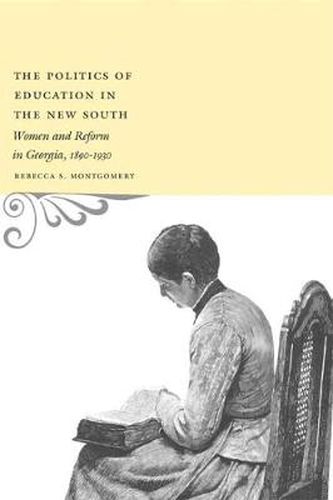Readings Newsletter
Become a Readings Member to make your shopping experience even easier.
Sign in or sign up for free!
You’re not far away from qualifying for FREE standard shipping within Australia
You’ve qualified for FREE standard shipping within Australia
The cart is loading…






This title is printed to order. This book may have been self-published. If so, we cannot guarantee the quality of the content. In the main most books will have gone through the editing process however some may not. We therefore suggest that you be aware of this before ordering this book. If in doubt check either the author or publisher’s details as we are unable to accept any returns unless they are faulty. Please contact us if you have any questions.
Alarmed at the growing poverty, illiteracy, class strife, and vulnerability of women after the upheavals of Reconstruction, female activists in Georgia advocated a fair and just system of education as a way of providing economic opportunity for women and the rural and urban poor. Their focus on educational reform transfigured private and public social relations in the New South, as Rebecca S. Montgomery details in this expansive study. The Politics of Education in the New South provides the most complete picture of women’s role in expanding the democratic promise of education in the South and reveals how concern about their own status motivated these women to push for reform on behalf of others. Montgomery argues that women’s prolonged campaign for educational improvements reflected their concern for distributing public resources more equitably. Middle-class white women in Georgia recognized the crippling effects of discrimination and state inaction, which they came to understand in terms of both gender and class. They subsequently pushed for admission of women to Georgia’s state colleges and universities and for rural school improvement, home extension services, public kindergartens, child labor reforms, and the establishment of female-run boarding schools in the mountains of North Georgia. In the process, a distinct female political culture developed that directly opposed the individualism, corruption, and short-sightedness that plagued formal politics in the New South.
$9.00 standard shipping within Australia
FREE standard shipping within Australia for orders over $100.00
Express & International shipping calculated at checkout
This title is printed to order. This book may have been self-published. If so, we cannot guarantee the quality of the content. In the main most books will have gone through the editing process however some may not. We therefore suggest that you be aware of this before ordering this book. If in doubt check either the author or publisher’s details as we are unable to accept any returns unless they are faulty. Please contact us if you have any questions.
Alarmed at the growing poverty, illiteracy, class strife, and vulnerability of women after the upheavals of Reconstruction, female activists in Georgia advocated a fair and just system of education as a way of providing economic opportunity for women and the rural and urban poor. Their focus on educational reform transfigured private and public social relations in the New South, as Rebecca S. Montgomery details in this expansive study. The Politics of Education in the New South provides the most complete picture of women’s role in expanding the democratic promise of education in the South and reveals how concern about their own status motivated these women to push for reform on behalf of others. Montgomery argues that women’s prolonged campaign for educational improvements reflected their concern for distributing public resources more equitably. Middle-class white women in Georgia recognized the crippling effects of discrimination and state inaction, which they came to understand in terms of both gender and class. They subsequently pushed for admission of women to Georgia’s state colleges and universities and for rural school improvement, home extension services, public kindergartens, child labor reforms, and the establishment of female-run boarding schools in the mountains of North Georgia. In the process, a distinct female political culture developed that directly opposed the individualism, corruption, and short-sightedness that plagued formal politics in the New South.